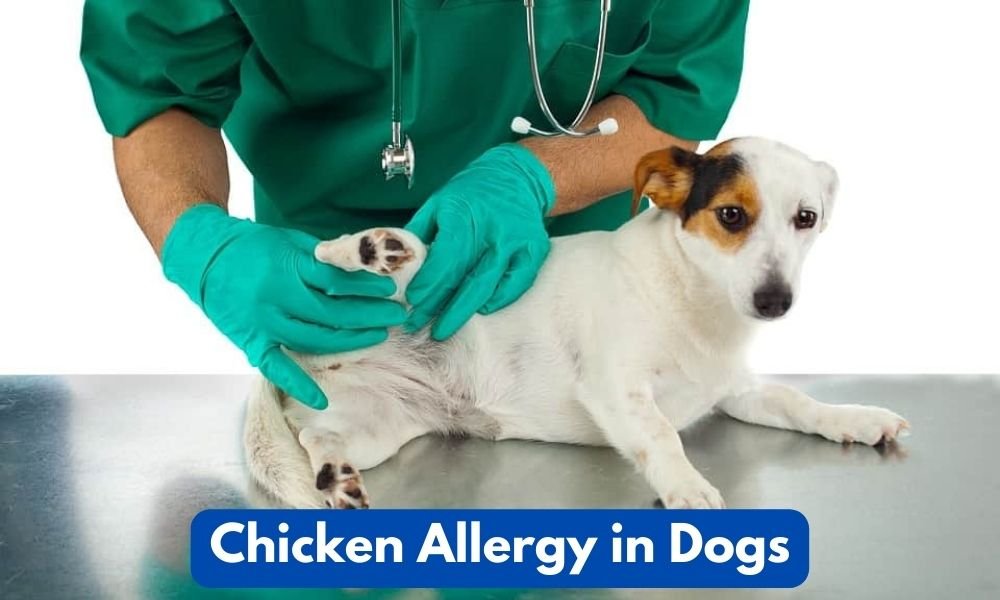Chicken Allergy in Dogs – Can Dogs Eat Eggs if They are Allergic to Chicken?

Chicken is an ingredient found in numerous dog foods and treats. However, some dogs might develop an allergy to chicken protein or similar poultry products like duck or turkey. This can result in symptoms such as skin irritation, ear infections, digestive issues, or even rare cases of anaphylaxis.
If your dog has a chicken allergy you may be curious about whether they can consume eggs since they also come from poultry. The answer isn’t straightforward. Depends on the dog and the severity of their allergy.
In this blog post, we will delve into the causes, symptoms, diagnosis, treatment, and prevention of chicken allergies in dogs. Additionally, we will discuss the advantages and disadvantages of feeding eggs to dogs with chicken allergies.
But first, let’s begin by understanding the causes…
What Causes Chicken Allergy in Dogs?
It’s important to note that a chicken allergy in dogs is not something they are born with; it develops gradually over time due to repeated exposure, to chicken or related products. Dogs that consume chicken frequently have a chance of developing an allergy to it.
Although the precise process of how a chicken allergy forms is not understood, it involves the immune system mistakenly recognizing chicken protein as an intruder and generating antibodies to combat it. When a dog consumes chicken after being exposed to these antibodies, it triggers a response leading to allergic symptoms.
Certain factors can increase the likelihood of dogs developing a chicken allergy, such, as
- Genetics: Some dog breeds like labrador retrievers, golden retrievers, German shepherds, cocker spaniels, and bulldogs are more susceptible to food allergies.
- Age: Most allergies don’t emerge until after three years old.
- Diet: Feeding your dog chicken or chicken by-products may increase the risk of an allergy.
Also, read this article to find out whether dogs can eat chicken feet.

Symptoms of Chicken Allergy in Dogs
The symptoms of a chicken allergy in dogs can vary based on the dog and the severity of their reaction. Common signs include;
- Skin problems: Like redness, itching, rashes, hives, and hair loss. These symptoms mainly affect areas like the paws, abdomen, groin, face, and ears.
- Ear issues: Like scratching at ears, head shaking, ear discharge, or odor;
- Digestive issues: Such as vomiting, diarrhea, gas, or bloating. Respiratory problems; These can encompass symptoms like sneezing, coughing, wheezing, or experiencing difficulty in breathing.
- Behavioral issues: These may involve feeling lacking energy being down or sad being easily irritated or moody or having a reduced desire to eat.
In rare cases, dogs with a chicken allergy can experience a severe allergic reaction known as anaphylaxis. This is a life-threatening condition that requires immediate attention. Signs of anaphylaxis include;
- Swelling of the face
- Appearance of hives
- Fainting
- Shock
- Unconsciousness
- Ultimately, death.
If you notice any of these signs in your dog after eating chicken or any other food item, call your veterinarian or an emergency clinic right away.
Can a dog survive chicken allergy reactions?
Yes, a dog can survive chicken allergy reactions if they receive prompt and appropriate veterinary care. However, some allergic reactions can be life-threatening and require immediate intervention.
The most severe type of allergic reaction is anaphylaxis, which can cause facial swelling, hives, collapse, shock, coma, or even death. If you observe any of these symptoms in your dog following the consumption of chicken or any other food item it’s essential to contact your veterinarian or an emergency clinic right away.

How to Tell if Your Dog is Allergic to Chicken
Diagnosing chicken allergies in dogs can be quite a challenge as the symptoms often resemble those of conditions or types of allergies. For instance
- Skin problems can arise from flea bites,
- Ear infections from yeast or bacteria,
- Digestive issues from parasites or infections, and
- Respiratory difficulties from pollen or dust.
Hence your veterinarian will need to eliminate the other possible causes before confirming a food allergy. This might involve conducting tests such as physical examination, skin scraping, blood tests, fecal tests, urinalysis, X-rays, and ultrasound scans.
The most reliable method for diagnosing a food allergy in dogs is by implementing a food trial. This entails feeding your dog a hypoallergenic diet that incorporates proteins like venison or rabbit and unique carbohydrates like potato or rice, for a duration of 8 to 12 weeks.
Throughout this period you must ensure that your dog doesn’t consume any food items treats supplements medications or table scraps that may contain allergens. If your dog’s symptoms improve during the course of the food trial, it is safe to assume that they indeed have a food allergy.
So, what you can do is gradually introduce food items one by one to see if any of them cause a reaction in your dog. It may take some time and effort. However, it is the most reliable method to pinpoint the specific food allergens that affect your furry friend.

How Do You Treat a Dog With Chicken Allergy?
The most effective way to treat a chicken allergy in dogs is to avoid giving them any chicken or chicken-based products. This entails reading the labels of all dog food, treats, supplements, and medications you provide to ensure they do not contain any chicken ingredients. It may also be necessary to refrain from feeding your dog any food that could potentially have chicken in it such as soups, stews, casseroles, or salads.
In the event that your dog accidentally consumes chicken or experiences an allergic reaction, you may be able to manage its symptoms by using antihistamines, corticosteroids, or anti-inflammatory drugs prescribed by your veterinarian. However, please note that these medications are not a long-term solution, and prolonged use may result in side effects. Therefore, it is crucial to use them only as necessary and under the supervision of a veterinarian.
If your dog exhibits reactions or experiences anaphylaxis (a life-threatening condition), immediate veterinary care is essential. During this emergency situation, your dog might receive injections of epinephrine (adrenaline), antihistamines, corticosteroids, or fluids to stabilize their condition and prevent complications.
Prevention of Chicken Allergy in Dogs
Just like I mentioned earlier, the best way to prevent a chicken allergy in dogs is by not feeding them chicken or any chicken-based products from an early age. This reduces the likelihood of their system becoming sensitive to chicken protein and developing an allergy later in life.
However, we understand that this may not always be feasible or practical, especially if you adopt an adult dog or are unsure about their diet. Instead, you can try providing them with a balanced and diverse diet that includes various sources of protein like beef, lamb, fish, or eggs. It’s also beneficial to rotate their diet every month to avoid them getting too accustomed to one type of protein and potentially developing an allergy to it.
Another effective approach to prevent a chicken allergy in dogs involves boosting their system and reducing inflammation in their body. You can achieve this by;
- Ensuring they have access to water and fresh food.
- Avoiding additives, preservatives, or colors in their food.
- Supplementing their diet with omega-3 fatty acids, probiotics, or antioxidants.
- Maintaining a healthy weight for your dog through exercise.
- Creating a stress-free environment thereby minimizing anxiety for your furry friend.
- Keeping up with vaccinations against diseases and parasites.
- Scheduling veterinary checkups along, with proper dental care.
By following the steps mentioned above you can significantly reduce the risk of your dog developing a chicken allergy while promoting the health of your beloved pet.
Also, read this article about Probiotics for dogs.
Alternative Protein Sources for Dogs with Chicken Allergies
If your dog is allergic to chicken, there are a number of other protein sources that you can feed them. Some good options include:
- Fish
- Duck
- Rabbit
- Kangaroo
- Turkey
- Venison
- Duck
- Rabbit
- Kangaroo
- Beef
- Lamb

Can Dogs Eat Eggs if They Are Allergic to Chicken?
Yes, it is generally safe, for dogs with chicken allergies to consume eggs. Eggs can actually offer several health advantages for dogs. However, it’s important to note that some dogs may also have allergies to eggs so it is recommended to slowly introduce them into your dog’s diet.
For safety, it is best to cook the eggs and serve them as treats or as a supplement alongside your dog’s regular meals. However, you must still keep an eye out for any signs of reactions or intolerance, in your furry friend.
Here are a few pros and cons to consider when it comes to feeding eggs to dogs, with chicken allergies;
Pros;
- Eggs offer a deal of protein and various essential nutrients like vitamins, minerals, and fatty acids.
- Compared to other protein sources like chicken, eggs are less likely to trigger reactions.
- Eggs can be prepared in several ways making them a versatile ingredient for dog food.
Cons;
- Some dogs may have allergies to eggs.
- Eggs can potentially harbor bacteria, hence they require proper cooking.
- They are high in cholesterol content, hence, it’s important to exercise moderation when including eggs, in your dog’s diet.
How to introduce egg to dogs with chicken allergies
To introduce eggs to dogs that have allergies to chicken follow these steps;
- Opt for fresh and organic eggs whenever possible. Avoid using eggs that have expired or show signs of cracks or leaks.
- Ensure the cooking of the eggs to eliminate any bacteria or parasites. You can choose to boil, scramble or poach the eggs. Refrain from adding salt, oil, butter, or spices.
- Use the eggs as a treat or supplement in your dog’s regular diet. It is recommended not to exceed one egg per day for small dogs and two eggs per day for large dogs.
- Observe your dog closely for any signs of reactions or intolerance, after introducing the eggs. If your dog handles them well without any issues, you may continue incorporating them into their diet.
Please note that every individual dog may react differently; therefore monitoring their response is crucial when introducing foods into their diet.

Can dogs be allergic to chicken but not turkey?
Yes, it is very possible for dogs to have chicken allergies while not being allergic to turkey or vice versa. The reason behind this lies in the fact that chicken and turkey contain different proteins in their meat. It is possible for a dog to develop an allergy to one type of protein but not exhibit any reaction to the other.
Nonetheless, there are also dogs that could be allergic to both chicken and turkey as well as other poultry options like duck or goose. Consequently, it is advisable to either conduct a food trial or seek guidance from your veterinarian before introducing any poultry products into your dog’s diet.
FAQs – Can Dogs Eat Eggs if They are Allergic to Chicken?
Here are some frequently asked questions about chicken allergy in dogs and feeding eggs to dogs with chicken allergy.
How long does it take for a chicken allergy in dogs to go away?
A chicken allergy in dogs does not go away on its own. However, with proper treatment, your dog’s symptoms can be managed and they can live a normal life.
How is a chicken allergy in dogs diagnosed?
A chicken allergy in dogs is diagnosed through a process of elimination. Your veterinarian will rule out other possible causes of your dog’s symptoms before diagnosing a chicken allergy.
What are some common triggers for chicken allergies in dogs?
Common triggers for chicken allergies in dogs include chicken-based foods, treats, and chews. It is also possible for dogs to be allergic to chicken dander or feathers.
Can dogs with chicken allergies eat eggs?
While it is possible for dogs to be allergic to both chicken and eggs, it is not common. Eggs are a good source of protein and other nutrients for dogs, and they are less likely to trigger an allergic reaction than other protein sources.
Can my dog be allergic to chicken but not beef?
Yes, it is indeed possible for a dog to have an allergy to chicken while not being allergic to beef. Every dog may exhibit varying sensitivities and allergic responses to proteins found in their food. Although chicken is frequently known as an allergen for dogs, there are instances where dogs can tolerate beef or have a sensitivity towards it instead.
Can dogs eat scrambled eggs if they are allergic to chicken?
If your furry companion has a chicken allergy, their ability to consume scrambled eggs will depend on whether they’re allergic to eggs or any of the additional ingredients used. Again, to determine if your dog can safely enjoy scrambled eggs without experiencing any reactions, it is advisable to conduct a food trial or seek guidance from a veterinarian.
Can dogs eat boiled eggs if they are allergic to chicken?
Boiled eggs are cooked eggs that are boiled in water without any added ingredients. If your dog is allergic to chicken, they may or may not be able to eat boiled eggs, depending on whether they are also allergic to eggs. To find out if your dog can eat boiled eggs without having an allergic reaction, you should conduct a food trial or consult your veterinarian.
How common is chicken allergy in dogs?
How common is chicken allergy in dogs?
Chicken allergy is one of the most common food allergies in dogs, affecting up to 15% of dogs. It is caused by an overreaction of the immune system to chicken proteins. The most common symptoms of chicken allergy in dogs include itching, scratching, skin rashes, ear infections, and diarrhea.
Conclusion
In summary, chicken allergies are quite common in dogs and they can lead to symptoms like skin irritation ear infections, digestive issues, or even anaphylaxis. To diagnose and treat a chicken allergy in your dog, it is necessary to conduct a food trial or seek advice from your veterinarian. However, preventing chicken allergies in dogs requires avoiding the inclusion of chicken or any chicken-based products in their diet.
If your dog has a chicken allergy you might be curious to know whether they can still consume eggs since they also come from poultry. The answer is not straightforward as it depends on the dog and the severity of their allergy. Some dogs with a chicken allergy may tolerate eggs without any issues while others may experience a reaction. To be certain about their tolerance towards eggs, conducting a food trial or consulting with your veterinarian is necessary.
While eggs can provide benefits for dogs, like protein, fat, vitamins, minerals, and antioxidants; there are also drawbacks to consider. These include the possibility of triggering a reaction increasing the risk of salmonella infection causing biotin deficiency, obesity concerns, or even pancreatitis.
If you’re considering giving eggs to your dog who has an allergy to chicken it’s essential to ensure that they aren’t allergic, to eggs. Additionally, make sure to cook the eggs before feeding them. Remember to offer the eggs in moderation and adjust their calorie intake accordingly.
I trust that this blog post has provided you with enlightening information for both you and your furry companion. We appreciate your time spent reading! Please, share this article.
References:
- Pet Carerx – Is My Dog Allergic to Chicken?
- Wag Walking – Poultry Allergies in Dogs
- VCA Hospitals – Food Allergies in Dogs





